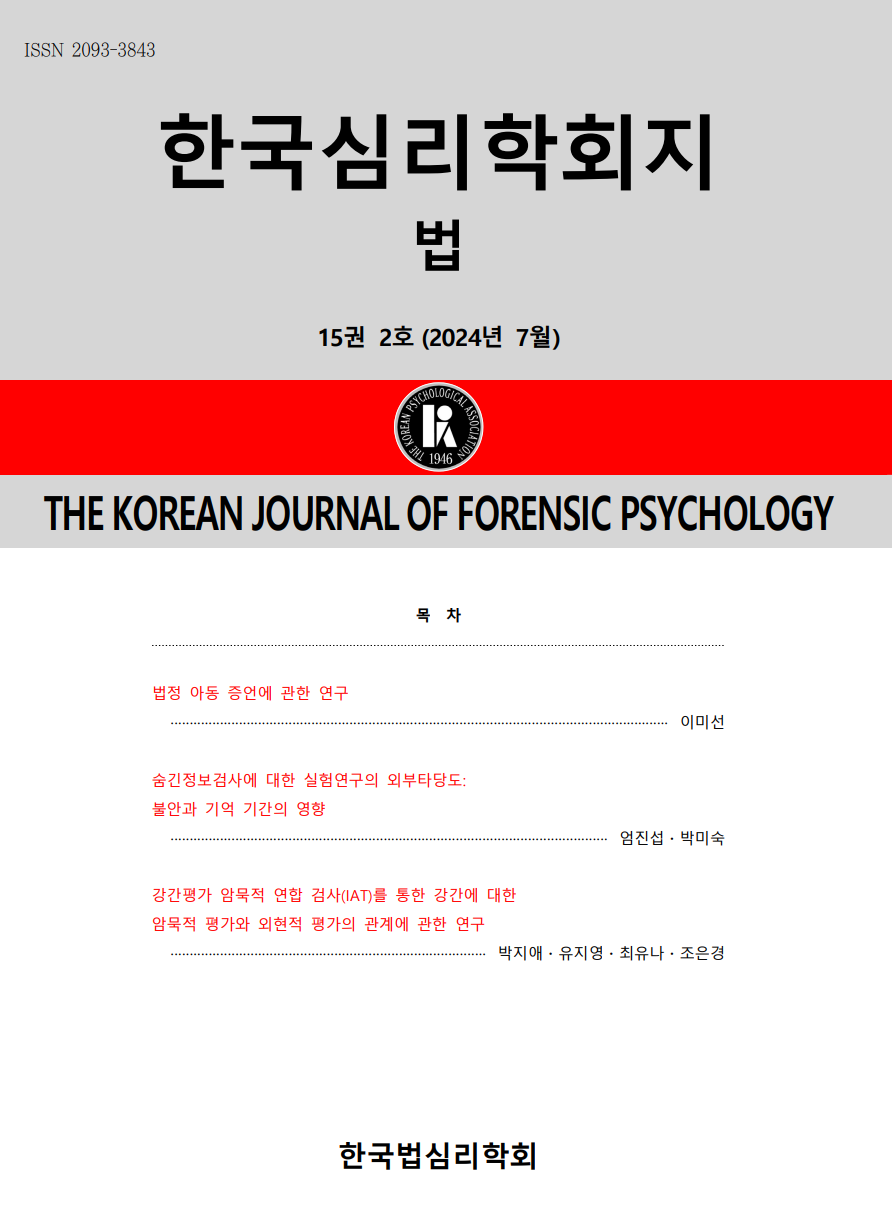open access
메뉴
open access
메뉴 ISSN : 2093-3843
ISSN : 2093-3843
Children with intellectual and/or developmental disabilities are more vulnerable to abuse and maltreatment than their typically developing peers and yet their participation in the criminal justice system in rare. Children with mild to moderate intellectual disabilities could recall useful information in the forensic context. There have been, however, few overviews in Korea with respect to the characteristics and capacities of children's testimony with intellectual disabilities and/or developmental disorders in forensic context. Thus, this paper examines the types of additional factors that might need to be taken into account for children with intellectual disabilities and whether these may influence the quality of children’s testimony based on the recent literature published on abroad. It should be guided and be helpful for further researches, particularly in terms of assessing the performance of children with specific developmental disorders including Down Syndrome, Autism Spectrum Syndrome, and Williams Syndrome, would consolidate our knowledge and provide professional practitioners with an empirical basis in order to structure their investigative interviews with children depending upon their particular profile of abilities and disabilities in reporting what they had personally experienced or witnessed.
Foreign exchange derivative (FED) is a speculation instrument engineered for the customer to trade risks of exchange loss (exchange risks) with risks created by the contract (contract risks) with a bank. The present study investigated whether the written explanation of the bank about the risks created to the customer by the contract can be qualitatively comprehended by ordinary adults in 30s and 40s of age. The degree to which the participants qualitatively comprehended the risks involved in the contract was objectively measured after they read the conditions of the FED contract and one of four different types of explanation about the possible outcomes of the same contract. The participants also imagined themselves as customers suggested of the FED contract by a bank and decided whether or not to enter into the contract. The participants showed enhanced comprehension of risks created by fluctuations of the market exchange rates (exchange risks) when they read the type of thorough explanation specifying all risks involved with the contract. However, for the risks created by the contract (contract risks), the comprehension of the participants who read the thorough explanation was not at all superior to that of the participants who read no explanation at all about the contract. On the other hand, the participants who read the explanation specifying only the exchange risks with no mention about the contract risks showed inferior overall comprehension of the contract compared to the participants who read no explanation at all about the contract. The explanation about the contract without a mention of the contract risks may not only reduce the comprehension of the contract conditions but also create false understanding of the contract to the customers. Finally, the participants with poor comprehension of the contract conditions were more likely to decide to enter into the contract than were the participants with high levels of comprehension.
This study examined the effects of simultaneous misinformation on eyewitness memory. Two hundred forty five college students participated. In one condition (Simultaneous condition), participants viewed a video of a simulated crime simultaneously presented with accurate, misinforming, or neutral audio narrations. In the other condition (Post-event condition), participants read accurate, misinforming, or or neutral narratives after viewing the video. One week later, participants had a recognition memory test. The results showed memory about misinforming information was significantly less accurate and less confident than the accurate or neutral information categories, for both conditions. Overall memory accuracy and confidence rate were lower for the simultaneous condition than the post-event condition, although the accuracy for the misinforming information were not different between two conditions. There was no difference on memory accuracy between perpetrator related and environment related items. The results indicated the negative effect of simultaneous misinformation on eyewitness memory when there were changes of timing, modality, and attention about the misinformation from the previous post-event misinformation research.